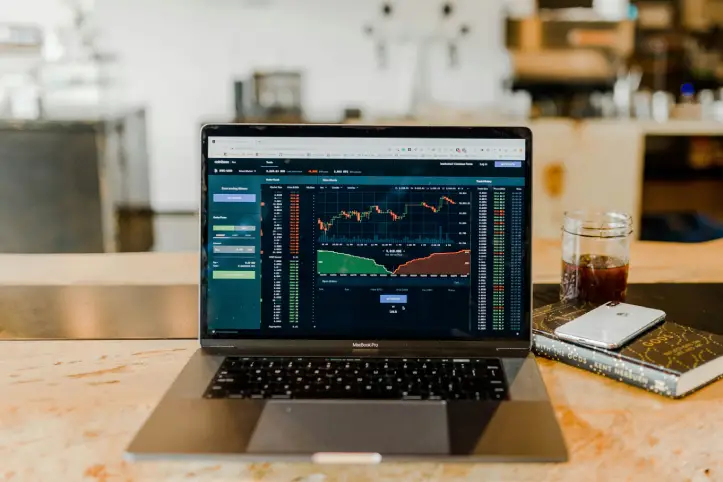In this article, I’ll talk about the stockbrokers I’ve employed and investigated. Throughout my five-year investment career, I’ve come across several trading platforms. I’ve analysed everything from full-service brokers like ICICI Direct, HDFC Securities, SBI Smart, and others to emerging discount brokers like Angel One, Zerodha, Upstox, 5Paisa, Trade Smart Online, and more. Furthermore, as a trader, I must stay up to speed on the latest brokers and their fees.
You should have a clear understanding of where you should open your trading and demat account at the end of this essay. While responding, I’ll attempt to keep things as basic as possible. In addition, I’ll reveal which stockbroker I employ for stock trading. As a result, make sure you read this article all the way through. I’m convinced it will be beneficial to you.
Where to open your Demat & Trading account?
1) Difference between demat and trading account?
Before we begin, let me provide a brief explanation of the distinction between demat and trading accounts so that we are all on the same page.
Similarly to how money is maintained in a savings account, your purchased stocks are held in a demat account. When you purchase a stock, the amount is deposited to your demat account. And when you sell it, it is deducted from the account. Your demat account always represents all of your owning stocks. A demat account, by the way, is an abbreviation for “Dematerialised account.”
A trading account, on the other hand, is a vehicle for buying and selling shares in a stock market. It is used in the market to place buy or sell orders for stocks.
Let’s imagine you wish to purchase some stock. Then you must input information such as ‘Which share do you want to purchase?’, ‘How many quantities of shares do you want to buy?’, ‘At what price do you want to acquire that shares?’, and so on. And all of these buy/sell orders are placed using a trading account.
You would need both a demat and a trading account to trade in Indian equities. In any case, both accounts are connected and can be created with any brokerage. Furthermore, in this day and age, creating these accounts is really straightforward and quick.
2) Do you need a stockbroker to trade in stocks?
This is one of the most commonly requested questions I get via email. As a result, I wanted to respond to this one here.
Yes, To trade in Indian equities, you would need a stockbroker.
You cannot just stroll into a stock exchange and purchase or sell stocks. There are several stages involved in the transfer and settlement of stocks to ensure that participants have a positive purchasing and selling experience. Stockbrokers, together with stock exchanges and regulators, play a significant part in this. To trade stocks, you will need a stockbroker.
3) What is a stockbroker?
A stockbroker is an individual or organisation that is a registered member of the stock exchange and has been granted permission to trade in the securities market on behalf of its customers.
Stockbrokers in India range from large banking organisations such as Angel One, ICICI Direct, and Kotak Securities to younger, rapidly rising startups such as HDFC Securities, Upstox and Alice Blue.
Stockbrokers can purchase and sell stocks on behalf of their clients on the stock exchange and charge a modest commission for this service. However, the commission is low in comparison to the quick trading platform that they provide. Using these services, you can buy/sell stocks in minutes while sitting on your couch using your web/phone.
4) What are the types of stockbrokers in India?
In India, there are two categories of stockbrokers: full-service brokers (Traditional Brokers) and discount brokers (Budget Brokers).
— Full-service brokers
Traditional brokers offer trading, research, and advising services for stocks, commodities, and currencies. Commissions are charged by these brokers as a percentage of each deal performed by their clients. They also assist Forex, Mutual Funds, IPOs, FDs, Bonds, and Insurance investments.
Here are a few instances of prominent full-service brokers in India:
— Discount brokers
These brokers only provide their clients the ability to trade equities, commodities, and currency derivatives. They do not provide consulting services. However, these stockbrokers may save you a lot of money on brokerage fees when trading stocks. In this case, you must pay a set brokerage fee on all conducted trades.
Here is a list of some of India’s best bargain stockbrokers:
5) Brokerage comparison while using full-service vs discount brokers
Let’s look at the brokerage fees of a full-service broker vs a cheap broker.
A full-service broker charges a predetermined percentage on each deal that their clients complete. This fee might range between 0.25 and 0.55% of the total deal value. The greater the brokerage, the larger the transaction.
The cheap broker, on the other hand, charges a set brokerage fee. This fee might range between Rs 10 and Rs 20 each transaction.
Furthermore, these fees apply to both parties of the trade. As a result, when you acquire a share, you must pay brokerage, and when you sell those shares, you must pay brokerage again.
For example, full-service broker ICICI Securities charges 0.275% in intraday brokerage. If we combine both purchasing and selling, the total brokerage in a deal will be 0.275%* 2 = 0.55%.
If you trade Rs 5 lakhs every month with ICICI direct, your total brokerage in a year will be 0.55% * 5,00,000 * 12 months = Rs. 33,000.
Let us now examine the brokerage fees charged by cheap brokers. In India, major discount brokers such as Angel One and Upstox charge Rs 20 every trade.
Assume you make 20 trades each month with a bargain broker. In this case, your annual brokerage will be Rs 20 (brokerage) * 20 trades per month * 12 months = Rs 4,800.
Clearly, using cheap brokers allows you to save a significant amount of money on brokerage fees. Furthermore, each of these brokers offer a comparable trading interface, so the overall experience is not very different. Overall, while trading with full-service brokers, you are paying some unnecessary brokerage.
6) What factors to check while selecting your stockbroker?
Brokerage charges are one of the most important elements to consider when selecting a stockbroker, since an overpriced broker might cost you money.
Apart from that, the second most important element to consider is the stockbroker’s reputation. A stockbroker with a lengthy track record of providing a dependable trading platform and excellent customer care should be favoured.
When you create a trading account with a stockbroker, you are entering into a long-term partnership. After creating your account, you might trade stocks for years. And you don’t want your brokerage business to be shut down in the middle, trapping all of your purchased securities. As a result, while selecting a stockbroker, constantly consider the stockbroker’s reputation and dependability. A quick Google search or reading the evaluations of existing consumers might assist in identifying red flags.
Furthermore, you should investigate their web and mobile trading platforms, advisory services (if you require trading assistance), customer support, and other benefits provided by that brokerage, such as research reports, trading/investing courses, and so on.
7) Where should you open your demat and trading account?
You should have a good understanding of stockbrokers in India by now. Next, we’ll get into the meat of this article: where you should open your demat and trading accounts.
If you need multiple services such as shares, mutual funds, bonds, currencies, fixed deposits, commodities, and so on, as well as research reports, you should open an account with a full-service broker such as ICICI direct, HDFC securities, and so on.
However, if you only want to trade equities (or commodities), I feel that creating accounts with inexpensive brokers is more profitable. They provide a quick trading platform with a minimal brokerage fee, allowing traders to save a lot of money.
Furthermore, with the emergence of the internet, the majority of the information required to make trading/investment decisions is now readily available online. If you want to read research studies on firms, you may do it on websites such as Trendlyne, Markets Mojo, and others.
Note: If you truly require advice services to buy and sell stocks, it is preferable to go with specialist advisory services in this sector that can provide you with personalised services rather than depending on these large organisations for whom you may be a very minor client.
8) Which stockbroker do I use?
For all of my traders, I use Angel One discount brokers. It is India’s largest brokerage, with over 1.75 crore satisfied customers. Angel One provides free equity delivery (zero brokerage) for long-term investments and a discount brokerage of up to Rs 20 for all other trades.
Initially, I began my investment career with ICICI. I choose ICICI for my account due to their outstanding reputation and 3-in-1 account servicing feature. Essentially, 3-in-1 means that you can open a savings, demat, and trading account all at the same time. So, in addition to opening a savings account with ICICI Bank, you may apply for the other two accounts.
I was pleased with the services provided until I discovered that I was paying excessive brokerage fees and that a portion of my profit was being paid to ICICI directly. Then I began looking into alternative stockbrokers where I could avoid these fees. Finally, I switched to Angel One, a bargain broker, and I’m pleased with its trading platform and services. Furthermore, after moving to Angel One, I’ve been able to save a significant amount of money on brokerage fees, which is always good for small retail investors like you and me.
Note: You can also read my complete review on Angel One stock broker here.
Other Frequently Asked Questions (FAQs) regarding trading and demat accounts.
1) How to open your demat and trading account?
Opening a trading and demat account is entirely online, paperless, and painless. You may open these accounts within an hour if you already have soft copies of your documentation (PAN card, Aadhar card, and saving account statement/Cancelled Cheque) on your mobile/laptop. Simply go to the stockbroker’s website and open an account.
Also see:
2) Can I open multiple accounts?
Yes, you are permitted to open several accounts.
In reality, you can establish as many trading accounts with different stock brokers as you wish. You may have one account with a bargain broker and another with a full-service broker if you choose.
Keep in mind, however, that you must pay annual maintenance charges (AMC) for all active accounts. This AMC might range between Rs 300 and Rs 700 per year (lower for bargain brokers). As a result, if you have three accounts, you may have to pay a maintenance fee of Rs 900-2100 every year, even if you are not actively utilising any of them.
3) Can I switch my previously purchased stocks from one demat account to another?
If you want to transfer your stocks from one demat account to another, you can do so.
You have two possibilities here. You can either fill up the DIS (Delivery instruction sheet) with the new demat account number and submit it to your prior stockbroker. They will transfer the shares after the paperwork is completed appropriately.
Otherwise, you can do it online using the CDSL’s EASIEST service. The central securities depository (CDSL) is situated in Mumbai. Once you’ve opened your account and linked your stock brokers, EASIEST allows you to transfer shares from one demat account to another with a few easy clicks.
4) How to close your demat account?
Probably the least often requested questions. However, I thought I’d put it here to round out the post.
To shut your demat account, fill out and submit the Account Closure Form accessible on your stockbroker’s website. It usually takes 7-10 days to cancel your account.
Make sure you don’t have any shares or a negative balance in your account before terminating it. If your account has been dormant for several years and you have not paid the AMC, you may have a negative amount. Additionally, if you have equities in the account, sell them or move them to another active account before cancelling this one.
Closing Thoughts
Buying and selling stocks is as simple as clicking your fingers in this digital age. All because of online stockbrokers.
There are several stockbrokers in India, and I hope that this essay has assisted you in selecting a broker for stock trading. If you have any further questions on where to open your demat and trading accounts, please leave a comment below. I’d be delighted to assist you.
Have a wonderful day, and happy investing!
















